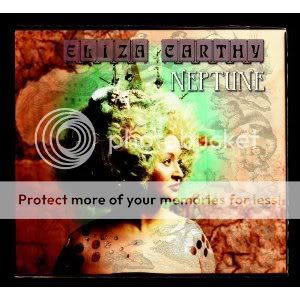
Eliza Carthy’s career has two distinct paths. While she is well known for her interpretations of traditional English folk songs (her renditions of which have gained many accolades), Carthy is just as likely to release an album of well-crafted, self-penned songs which fuse rock, pop and folk in a way that cannot be easily categorized. She followed 2004’s excellent ‘Rough Music’ (a collection largely comprised of traditional folk numbers, with an excellent rendition of Billy Bragg’s ‘King James Version’ thrown in for good measure) with ‘Dreams of Breathing Underwater’ in 2008, which stylistically could be seen as a successor to her very commercial ‘Angels and Cigarettes’ release from 2000. 2011’s self-penned ‘Neptune’ follows suit, once again showcasing Carthy as a gifted songwriter and arranger.
‘Neptune’ focuses on the imperfections of life, of relationships and is a journey across a number of years. It opens with a rousing number ‘Blood on My Boots’ – a drunken stomp across nearly six and a half minutes, opening with an electric guitar twang, before Carthy’s husky vocal compliments a gentle double bass line. For the chorus, the track takes on a old style bar-room quality, with dominant tack piano. Carthy’s lead is augmented by a pleasing backing vocal mixing gruff male voices and female oohs. The combination of darker story-telling and fusion of blues, jazz and folk works excellently as it leads up to a brief appearance of accordion before moving back to the main piano refrain. While each of the featured musicians plays a great part during this number, it’s Alexander’s piano line which leaves the greatest impression. The mood changes swiftly as we move into ‘War’, a quirky calypso influenced number. The vocal arrangement on this number is superb and the lyrics (concerning a fight) are at odds with the sunny arrangement. Of particular note is the excellently arranged horn section which fills an instrumental break. While Carthy appears adept at mixing folk and calypso elements, these talents do not stretch to a second calypso/reggae number. ‘Monkey’ has a really great Hammond organ part – but that’s it. The reggae is far, far too light, putting Carthy in a similar musical frame as Paolo Nutini and his nasty forays into reggae-pop.
After an a cappella opening where Carthy and her bandmates launch into the traditional folk song ‘The Oak and The Ash’, ‘Britain is a Car Park’ is one of the album’s most upbeat and adventurous numbers. The music is quirky, driven by an upright bass and fantastic horn section. The horns provide plenty of punch on a number which sounds like it could lapse into the theme from ‘Mission: Impossible’ at any given moment. Just when you think you’ve heard all it has to offer, it takes an unexpected turn with an extremely discordant accordion solo followed by police sirens. The musical quirks (and tightness of the arrangement) more than sustain an extremely busy five minutes. The mid-paced ‘Romeo’ is far moodier, with a vocal melody which recalls Carthy’s roots in English folk music. It’s a lyrically angry number concerning a relationship on breaking point, its edge given a little softness by a musical arrangement which features smooth strings and piano.
The closing of the album finds Carthy in a different place to where we found her at ‘Neptune’s beginning, with tales of family and motherhood. During ‘Hansel (Breadcrumbs)’, Carthy sounds vocally very assured against a full sounding band, once again dominated in places by Alexander’s piano lines on a number which melds tango influenced rhythms with European folk and a bitter edge. ‘Thursday’ tells of the sadness when it’s time to leave family members to go on tour. Against Phil Alexander’s gentle piano line and Bethany Porter’s cello, Carthy’s soft vocal is full of sadness and longing (one of ‘Neptune’s best), bringing the album to a low-key, but superb end.
Destined for heavy rotation on both Mike Harding and Bob Harris’s BBC Radio 2 shows, it’s an album full of very sophisticated adult singer-songwriter material with rootsy leanings. It’s a little light of English folk influences in places, so rather predictably, it should resonate with those who really loved ‘Angels and Cigarettes’ and ‘Dreams of Breathing Underwater’. Despite a couple of misses, ‘Neptune’ is one of Eliza Carthy’s strongest original works, with ‘Hansel’ in particular marking a career high.
May 2011
